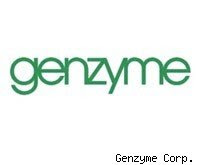Genzyme rival gets positive test results
 British drug maker Shire PLC stepped up the pressure on Cambridge biotechnology company Genzyme Corp. yesterday, reporting positive test results for a competitor to Genzyme’s drug for Gaucher disease and disclosing that US regulators will let doctors prescribe the rival drug before it is approved for commercial use.
British drug maker Shire PLC stepped up the pressure on Cambridge biotechnology company Genzyme Corp. yesterday, reporting positive test results for a competitor to Genzyme’s drug for Gaucher disease and disclosing that US regulators will let doctors prescribe the rival drug before it is approved for commercial use.Supplies of Genzyme’s enzyme replacement therapy Cerezyme, currently the only drug on the market to treat the rare genetic disorder, were interrupted in June when a virus was detected in the company’s Allston Landing plant.
While the plant resumed production last week after the decontamination of its bioreactors, Genzyme, the state’s largest biotechnology company, will continue rationing drugs to the least vulnerable patients until late this year, when new batches of the drugs can be shipped and inventories return to their full strength.
Shire’s competing drug, velaglucerase alfa, could be administered to some Gaucher disease patients in a matter of weeks, following Food and Drug Administration approval of a company plan for introducing the drug, called a treatment protocol. The agency solicited the protocol, a relatively uncommon arrangement that allows doctors to prescribe drugs for up to 12 months before they have received FDA approval. A treatment protocol is typically reserved for situations such as supply disruptions, where there are acute medical needs.
The early rollout of Shire’s drug could give the company a leg up in its efforts to grab a share of the market for Gaucher disease treatments. But the company had planned to submit a new drug application to the FDA even before Genzyme’s supply interruption.
“We’re just responding to the patient need at this point, which is what matters most,’’ said Sylvie Gregoire, the president of Shire’s human genetic therapies division in Lexington, which produces velaglucerase alfa, and other enzyme replacement drugs. “That’s what the FDA wants. If this turns into an opportunity for us, that’s fine.’’
Genzyme officials declined to comment yesterday. The company’s shares shed 2.91 percent, or $1.51, to $50.38 on the Nasdaq exchange. It was the second consecutive session of retreat for Genzyme shares, pushing its stock down 10.8 percent since Thursday.
The first drop came Friday, when the company disclosed that federal in spectors will be paying another visit to the Brighton facility because of concerns that previously identified production problems there hadn’t been “fully or adequately’’ addressed by Genzyme.
Shares of Shire, meanwhile, edged up 0.65 percent, or 29 cents, to $45.10 in Nasdaq Composite trading yesterday.
Gaucher disease is an enzyme deficiency in which fatty substances accumulate in the spleen, liver, lungs, bone marrow, and sometimes, the brain, causing bruising, enlarged organs, and lung and kidney ailments. It affects only about 5,700 people worldwide. But the treatment for it, which is often subsidized by governments or insurance companies, costs approximately $200,000 per year per patient, bringing the potential market for drug makers to about $1.2 billion.
In addition to Shire, two other drug companies, Actelion Pharmaceuticals Ltd. of Switzerland, and Protalix BioTherapeutics Inc. of Israel, are developing drugs to treat Gaucher disease.
Genzyme is likely to keep the lion’s share of the market in the near future, but finds itself under increasing regulatory and competitive pressure, said Christopher J. Raymond, senior biotechnology analyst for financial services firm Robert W. Baird & Co. in Chicago.
“They’ve had a string of setbacks,’’ Raymond said of Genzyme, citing the FDA inspection and the intensifying competition. “The situation has deteriorated since we first learned about the problems in Allston. I still have the utmost confidence they will get these problems fixed, but there’s a risk that the FDA might not get back in the plant on a timely basis or might find something else that they don’t like.’’
On the competitive front, Shire, which has nearly 1,000 employees in Lexington and Cambridge, yesterday reported positive results from the first of three phase 3 studies of veraglucerase alfa.
The data were consistent with previous studies that helped convince the FDA to accept the company’s treatment protocol that will allow doctors to prescribe the drug before it wins final approval by the agency.
Shire said it began a “rolling submission’’ of its new drug application last Wednesday, three weeks after it received fast-track designation from the FDA. The designation enables companies to file sections of the application as they become available, and allows the agency to review those sections before the entire application is filed. Shire said it expects to complete the application by Sept. 30.
Source : www.boston.com
read more» Read more...
















